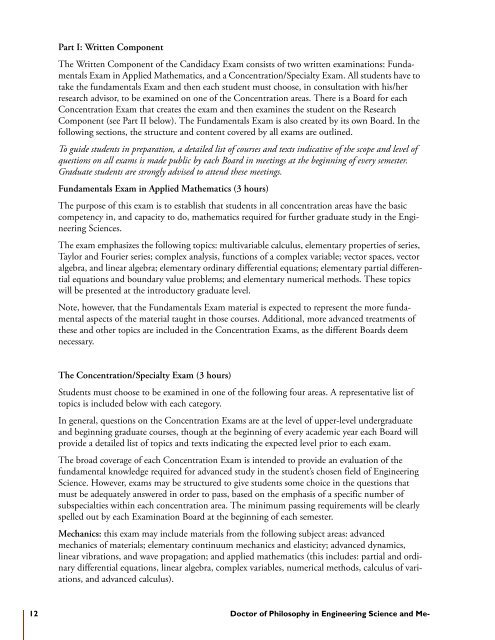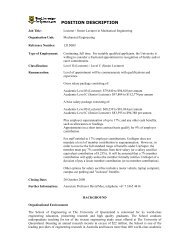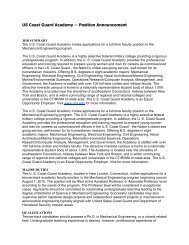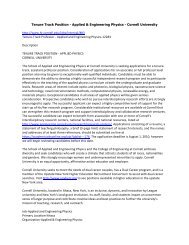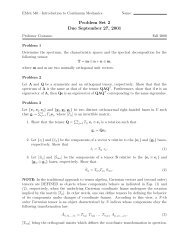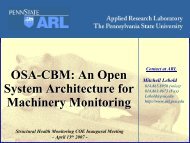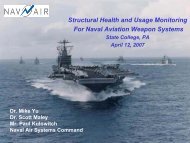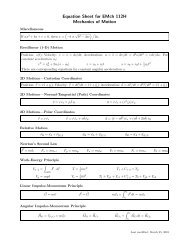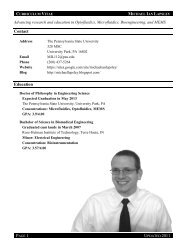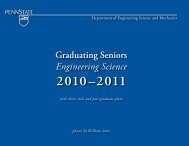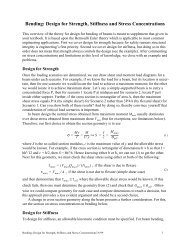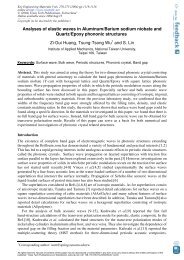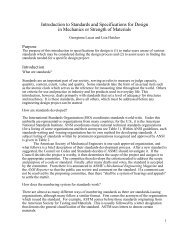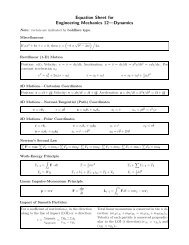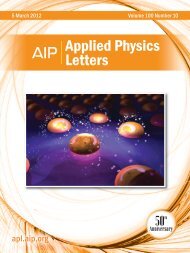ESM Graduate Student Guide - Department of Engineering Science ...
ESM Graduate Student Guide - Department of Engineering Science ...
ESM Graduate Student Guide - Department of Engineering Science ...
Create successful ePaper yourself
Turn your PDF publications into a flip-book with our unique Google optimized e-Paper software.
Part I: Written Component<br />
The Written Component <strong>of</strong> the Candidacy Exam consists <strong>of</strong> two written examinations: Fundamentals<br />
Exam in Applied Mathematics, and a Concentration/Specialty Exam. All students have to<br />
take the fundamentals Exam and then each student must choose, in consultation with his/her<br />
research advisor, to be examined on one <strong>of</strong> the Concentration areas. There is a Board for each<br />
Concentration Exam that creates the exam and then examines the student on the Research<br />
Component (see Part II below). The Fundamentals Exam is also created by its own Board. In the<br />
following sections, the structure and content covered by all exams are outlined.<br />
To guide students in preparation, a detailed list <strong>of</strong> courses and texts indicative <strong>of</strong> the scope and level <strong>of</strong><br />
questions on all exams is made public by each Board in meetings at the beginning <strong>of</strong> every semester.<br />
<strong>Graduate</strong> students are strongly advised to attend these meetings.<br />
Fundamentals Exam in Applied Mathematics (3 hours)<br />
The purpose <strong>of</strong> this exam is to establish that students in all concentration areas have the basic<br />
competency in, and capacity to do, mathematics required for further graduate study in the <strong>Engineering</strong><br />
<strong>Science</strong>s.<br />
The exam emphasizes the following topics: multivariable calculus, elementary properties <strong>of</strong> series,<br />
Taylor and Fourier series; complex analysis, functions <strong>of</strong> a complex variable; vector spaces, vector<br />
algebra, and linear algebra; elementary ordinary differential equations; elementary partial differential<br />
equations and boundary value problems; and elementary numerical methods. These topics<br />
will be presented at the introductory graduate level.<br />
Note, however, that the Fundamentals Exam material is expected to represent the more fundamental<br />
aspects <strong>of</strong> the material taught in those courses. Additional, more advanced treatments <strong>of</strong><br />
these and other topics are included in the Concentration Exams, as the different Boards deem<br />
necessary.<br />
The Concentration/Specialty Exam (3 hours)<br />
<strong>Student</strong>s must choose to be examined in one <strong>of</strong> the following four areas. A representative list <strong>of</strong><br />
topics is included below with each category.<br />
In general, questions on the Concentration Exams are at the level <strong>of</strong> upper-level undergraduate<br />
and beginning graduate courses, though at the beginning <strong>of</strong> every academic year each Board will<br />
provide a detailed list <strong>of</strong> topics and texts indicating the expected level prior to each exam.<br />
The broad coverage <strong>of</strong> each Concentration Exam is intended to provide an evaluation <strong>of</strong> the<br />
fundamental knowledge required for advanced study in the student’s chosen field <strong>of</strong> <strong>Engineering</strong><br />
<strong>Science</strong>. However, exams may be structured to give students some choice in the questions that<br />
must be adequately answered in order to pass, based on the emphasis <strong>of</strong> a specific number <strong>of</strong><br />
subspecialties within each concentration area. The minimum passing requirements will be clearly<br />
spelled out by each Examination Board at the beginning <strong>of</strong> each semester.<br />
Mechanics: this exam may include materials from the following subject areas: advanced<br />
mechanics <strong>of</strong> materials; elementary continuum mechanics and elasticity; advanced dynamics,<br />
linear vibrations, and wave propagation; and applied mathematics (this includes: partial and ordinary<br />
differential equations, linear algebra, complex variables, numerical methods, calculus <strong>of</strong> variations,<br />
and advanced calculus).<br />
12 Doctor <strong>of</strong> Philosophy in <strong>Engineering</strong> <strong>Science</strong> and Me-


